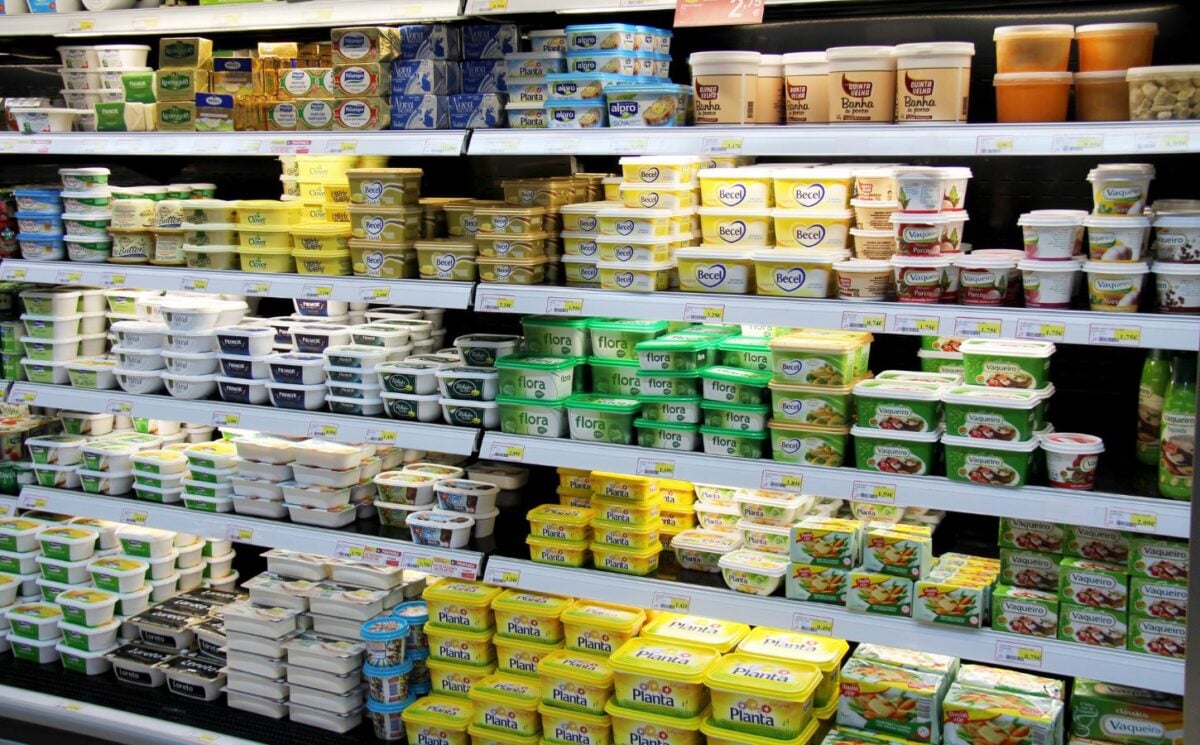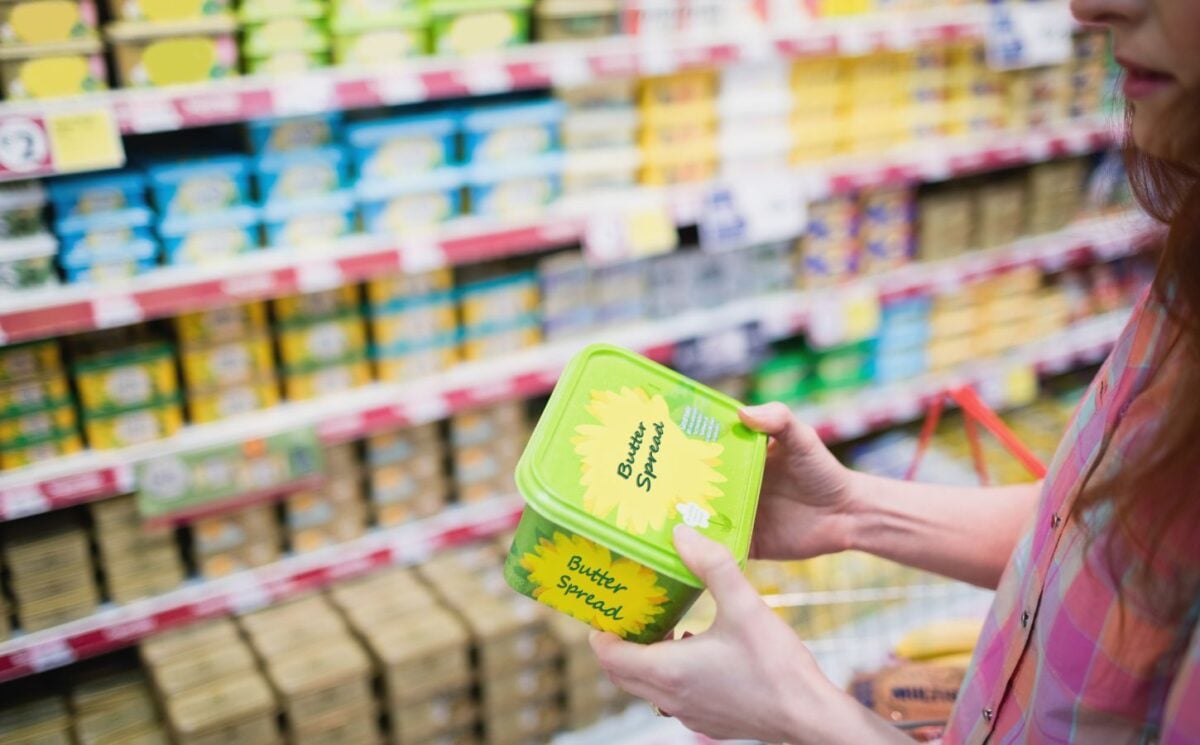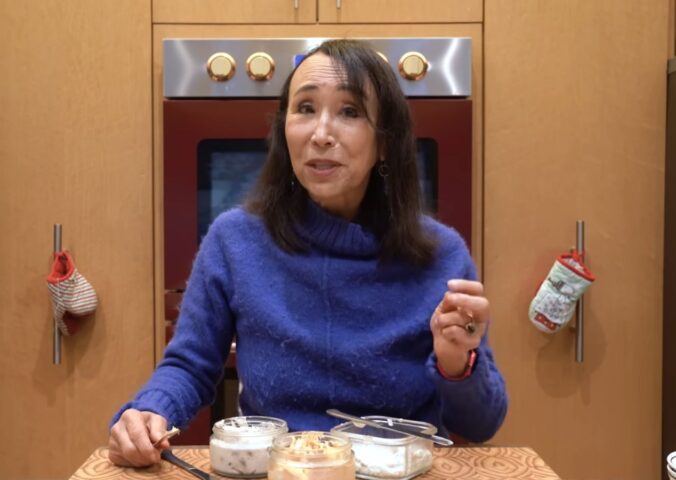With a growing number of dairy-free spreads and butters occupying supermarket shelves to choose from, you might be wondering whether traditional margarine – made with many of the same plant-based ingredients – is suitable for vegans. So, is margarine vegan? Here’s everything you need to know.
Read more: From Butter To Goat’s Cheese: 9 Homemade Vegan Dairy Recipes
What is margarine?

Where butter is churned from either cream or whole milk, margarine is made by emulsifying a blend of oils, fats, and water. Butter is often celebrated for its flavor and sometimes minimal processing, while leading margarine brands swap saturated fat for plant-based ones that are generally considered more “heart-healthy.”
Margarine was invented in the 19th century as a cost-effective alternative to butter made out of beef tallow. By the early 20th century, beef tallow had become expensive and was mostly swapped out for a combination of animal fats, which manufacturers blended with various vegetable fats and oils. By 1950, dairy was barely present in several leading brands.
While margarine’s post-war heyday may be mostly over now, Statista has estimated that around 8.5 million people in the UK remain “heavy margarine users.” This could be due to its relative affordability, its still-intact health halo, or simply that a number of Brits are looking to cut back on high-fat animal products such as dairy.
The different types of margarine
Broadly speaking, there are three main categories of margarine: bottled, liquid varieties that are useful for cooking; soft vegetable fat-heavy spreads made from rapeseed, olive, sunflower, and other plant oils; and hard blocks, which influence texture and are ideal for baking foods like scones, cakes, and muffins.
When it comes to nutritional and caloric value, margarine and butter-style “spreads” are hugely variable, with some options containing as little as 10 percent fat and some containing up to 90 percent. Where some brands have continued to add cream, whey powder, and other dairy derivatives to make products seem closer to butter, others, such as Flora, have now foregone animal ingredients entirely in favor of vegan certification.
Read more: Miyoko’s Creamery Introduces Two New Oat Milk Butter Flavors
Is margarine vegan?

While some brands do make margarine that is vegan-certified – or simply free from animal-derived ingredients – others definitely still rely on dairy products. Derivatives like lactose and whey remain common, as do a few tricky animal-derived ingredients that you might not realize are unsuitable for vegans by simply glancing at the ingredients list.
Some emulsifiers, such as mono- and diglycerides, can be made from either plant-based or animal-based sources, making them key ingredients to look out for. To avoid animal-based versions, look for product labels that either include clear vegan certification or specify that their emulsifiers come from plant-based sources like vegetable oil.
Certain additives and colourings may also come from either plant or animal sources, but common options such as tea-based annatto and vegetable-based carotene are vegan-friendly.
Vitamins, animal fats, and ‘marine oil’
Fortification can also complicate matters, as vitamins such as D3 – commonly found in breakfast cereals – are often (but not always) derived from lanolin, or “sheep grease,” harvested from wool. In contrast, vitamin D2 is generally not derived from animals, and can be sourced from plants or created synthetically. This information may also be printed on product labels or available online in relation to specific brands.
Most margarine brands may have stopped using tallow, but it is still worth keeping an eye out for beef derivatives on ingredients lists, along with cow, duck, and sheep fats, animal-derived suet, and the euphemistically named “marine oil,” which comes from cold-water fish such as salmon, mackerel, tuna, herring, and sardines.
Palm oil can also be a common ingredient in margarine and non-dairy spreads as it is cheap, versatile, and free from trans fats. However, palm oil is also a major driver of deforestation, biodiversity loss, and human rights violations. While some people avoid palm oil, it is almost ubiquitous, and others do not. (You can learn more about the ethical costs of palm oil here.)
Read more: Homemade Dairy-Free Herb Butter
Is margarine the same as plant-based butter?
Margarine certainly can be suitable for vegans, but it isn’t always. Some key plant-based options include dairy-free Stork, dairy-free I Can’t Believe It’s Not Butter, Stork’s Vegan Baking Block, and Flora’s margarine-style spreads. Several supermarkets also have private-label options, including Sainsbury’s budget-friendly Stamford Street Co. Soft Spread.
While margarine and vegan butter share a lot of the same ingredients, they are not always identical. Modern plant-based butter-style spreads are usually clearly labeled as vegan-friendly, and most – including options from major brands like Flora – tend to emphasize taste, texture, and color in a way that emulates butter more than some classic margarines.
Last year, the Independent crowned Flora’s “Plant B*tter” the best vegan butter of 2024 for its flavor, texture, meltable profile, and the fact that it’s available in both salted and unsalted. The paper also praised Mouse’s Favorite “Vegan Gold” butter, which is made with fermented cashew milk and coconut oil, and described it as “utterly delicious,” even eaten by itself with bread. Meanwhile, dedicated vegan spreads such as Naturli, Vitalite, Biona, and Pure are widely available in supermarkets, and small companies such as I AM NUT OK and Be Better My Friend offer luxurious, high-end butters.
Whole foods swaps and making your own butter
If you’re looking for vegan-friendly alternatives to traditional margarine and butter, you could also try whipping up your own version at home.
Many recipes rely on plant-based fats and oils like coconut or canola, combined with soy milk and vinegar to make vegan buttermilk. Alison Andrews of Loving It Vegan has a 7-ingredient recipe that she says is “spreadable, melts fabulously on toast, and is great for baking and frying,” while Richard Makin of School Night Vegan created a version seasoned with sea salt, lemon juice, and miso paste.
For the most nutritious option, simply swap in a single plant-based fat by itself. While olive oil or avocado on toast doesn’t have quite the same taste and texture as traditional butter, it still provides the satisfying combination of fat and carbs. Olive oil, a key part of the Mediterranean diet, has been linked to various health benefits, in addition to overall longevity. Meanwhile, avocados’ nutrient-dense healthy fats are thought to support the immune system.
Overall, swapping animal-derived saturated fats for plant-based unsaturated fats is thought to significantly reduce the risk of developing certain diseases and chronic health conditions, while eating more plant-based foods overall “significantly” improves people’s overall health.
Read more: Swapping Butter For Plant-Based Oil Reduces Risk Of Premature Death, Says New Study






